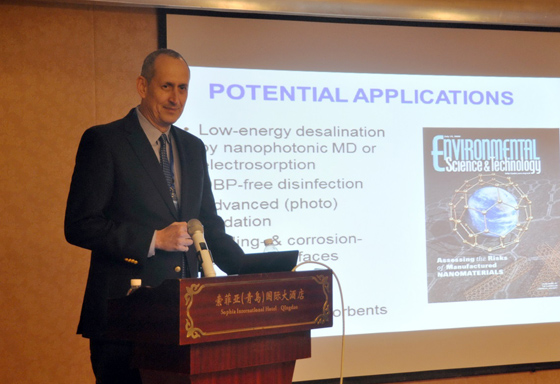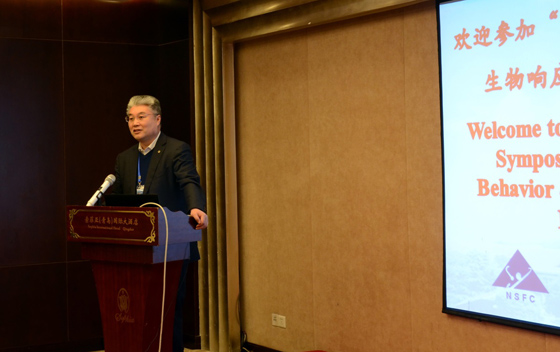
Top scientists from home and abroad came together to discuss the latest scientific breakthroughs in nanoparticle research at an international symposium held on April 3 and 4, 2015 here in Qingdao.
The theme of the symposium was Environmental Behavior and the Impact of Engineering Nanoparticles. It served as a crucial link in a major international scientific cooperation program supported by the National Natural Science Foundation of China (NSFC). Led by Dr. Wang Zhenyu, a professor at the Ocean University of China (OUC), the program aims to explore the interaction between engineered nanoparticles and organic pollutants in waters as well as their toxic mechanisms.
Nine distinguished scientists were invited to give a talk at the symposium on their latest research development in the environmental effects of nanoparticles. The symposium, co-organized by the Qingdao Collaborative Innovation Center of Marine Science and Technology, and the Key Laboratory of Marine Environment and Ecology of the Ministry of Education, provides an important platform for academic communication and aims at promoting interdisciplinary research and strengthening international cooperation.
Prof. Yu Zhigang, president of OUC, delivered a welcome speech, in which he pointed out that as an emerging and dynamic interdisciplinary area, researches on the environmental effects of nanoparticles is developing very fast at OUC. “As more and more engineered nanoparticles are used, their effects on coastal areas, especially in estuary, bay, and wetland areas is a hot topic that deserves more academic attention,” he added.
Prof. Wu Lixin, member of the Chinese Academy of Sciences, who is also the director of Qingdao Collaborative Innovation Center of Marine Science and Technology, said that the research in the effects of nanoparticles is a new area of research involving environmental sciences, material sciences, life sciences, and nanoscience. “The effect of nanoparticles in sea waters is a very complicated and relatively unstudied topic, and our Collaborative Innovation Center will continue to support the development of research in this field,” added Prof. WU.
Prof. Guo Jinyi, deputy inspector at the geoscience division of NSFC also delivered a speech. He said that the symposium is not only an academic endeavor but also an activity closely related to the everyday life of the general public.
The nine scientists invited to deliver a speech include Prof. Pedro Alvarez from Rice University who is the deputy editor-in-chief of Environmental Science & Technology; Prof. Patricia Holden with the University of California, Santa Barbara; Prof. Baoshang Xing from University of Massachusetts Amherst; Prof. Chen Jingwen with Dalian University of Technology, a recipient of National Science Fund for Distinguished Young Scholars, and a professor of the “Cheung Kong Scholars Program”; Prof. Liu Jingfu, research fellow at the Research Center for Eco-Environmental Sciences, the Chinese Academy of Sciences, and also a winner of National Science Fund for Distinguished Young Scholars; Prof. Wang Xiangke from the North China Electric Power University and an awardee of National Science Fund for Distinguished Young Scholars; Prof. Yao Jun with the University of Science and Technology Beijing who has also received the award of the National Science Fund for Distinguished Young Scholars; Prof. Zhang Zhiyong, research fellow at the Institute of High Energy Physics, the Chinese Academy of Sciences; and Prof. Zhu Dongqiang from Nanjing University, a professor in the “Cheung Kong Scholars Program, who was awarded the National Science Fund for Distinguished Young Scholars.
The symposium was also attended by over 50 scientists from 30 domestic universities and research institutes. Representatives from the OUC College of Environmental Science and Engineering, and the Office of Science and Technology were also present.

Translated by Nina Cui
Proofread by Shane Velez and William ZOU







